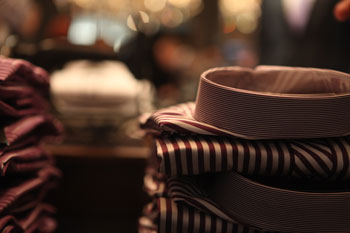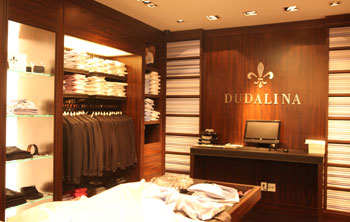Dudalina: Brazil Textile Company
Dudalina is a Brazilian textile company which is aiming to show its success and high quality textile products further behing the borders of Brazil. Dudalina is a family-owned company which has grown immensely during the last years and is expected to continue this trend.
Interview with Sônia Regina Hess de Souza, President of Dudalina
How is the Brazilian government helping the textile sector to grow and develop? In which areas can Brazil be competitive?
The textile industry in Brazil has 3 million direct workers, mainly in the area of confection. Taxes are overwhelming with 42% taxation on our textile products. Accounting costs are also high. In fact, because there are so many taxes, we are forced to increase the number of workers in the accounting department.
The real valorisation regarding dollar makes it so that China targets Brazil and Brazil targets China. Not only China but also Korea and Bangladesh are bringing low cost (textile) products into Brazil. I usually say that we are importing low cost labour. True, labour in Brazil is not expensive but high costs are incurred for both the employee and the employer. If I pay R$ 1000 to an employee, it’s still going to cost me R$ 2000 to maintain this person.
Our textile sector is a very creative one. If you want to stay in business, you need to look for ways to add value to your company. Dudalina is 55 years old and, at first, we only made shirts for men and had to bet on woman’s shirts (and blouses), too. Dudalina has been a success in Brazil and we intend to try to export the brand to other countries. Brazil’s president has created a program that is supposed to help our textile sector but, according to our calculations, it seems like it is going to be expensive and not help us so much. Brazil needs to invest in production, technology and people. Human capital is very important.
In which aspects is the Brazilian textile industry better than the Chinese one? Is it competitive in terms of exportation?
In the textile area, we have no competitive aspects in terms of exportation regarding China. We have brands. If you develop a brand, you create a value; for example, the “Havaianas“. The only way in which Brazil has to compete is in its capacity for differentiating. It’s strange to think that Brazil is the largest coffee exporter in the world while Japan is the biggest premium café exporter while that country doesn’t produce a single coffee bean. Brazil is a big commodities exporter and we have to transform these commodities into premium products.
Brazil is fashionable and the entire world is watching it. The government and also the entrepreneurs have to make the companies and the country more human.
Can you tell us a little about how Dudalina started and how you came to the 1 billion strategy?
Dudalina is a love story. “Duda” was how people knew my father and “Lina” is part of Adelina, my mother’s name. When they met each other they wanted to have 20 children, but they only had 16.
Dudalina is a love story. We have four brands: “Base”, “Individual”, “Dudalina Masculina” and “Dudalina Feminina”. All these make Dudalina a very prominent and strong brand in Brazil.
The great entrepreneur of the family was my mother. My father was a very hard-working man but more of a poet. We always said that my father was the heart and my mother, of a German origin, the reason. Between taking care of her children and the family business, she had no time left to shop for groceries, so my father did that. There was a store with everything in it: from bread to beans, milk and even clothes. In one of his trips to the town store, my father bought a fabric that didn’t have anything to do with the family business. Instead of being angry, my mother immediately saw the opportunity to start making shirts. She cut the fabric, hired two seamstresses and, knowing that she hadn’t got a market for shirts in our small town, she went to the interior of the country to sell them.
Their 16 children started working from a very young age in the company. When my mother left to start working on the most socially responsible and sustainable project called “the Social Bag”, her kids continued with the initial business. Nowadays, we have strategic governance in our company due to the size of the family. I’m actually preparing the company to ensure its continuity, because it has grown to 1700 direct workers and it’s not just a family business anymore, it’s a society. Our board of directors has family members as well as outside experts that are highly professional. Our board of management accompanies the company development and we also have a great team – from accounting to seamstresses and all the people in each sector of the company. I’m actually the least important person here. I’m only conducting this great orchestra that plays each instrument in a coherent way.
We have four brands: “Base“, “Individual” and “Dudalina Masculina“. In 2010, we made our entrance in the feminine textile market “Dudalina Feminina” with the symbol “Flor-de-Liz”, which is highly recognized in Brazil. All these make Dudalina a very prominent and strong brand in Brazil.
We want to reach a turnover of 1 billion in 2016. We were always an industry and now we have developed a brand. We have invested in research and development to make something authentic and unique and thanks to that we went into retail. We have a concept store in São Paulo with all our brands in a pleasant space, as well as small stores with just feminine shirts (blouses). The collections are gigantic: we manufacture 1500 different blouses each year and around 2000 men’s shirts. For men, we also have trousers, coats, knitting, and shoes in a more complex mix. For women, we only make blouses, polo shirts, and knitting.
In 2011, Dudalina opened 30 stores and this year maybe 45 more throughout Brazil. That’s our strategy to grow and develop in the local market.
We are going with a partner to Milan, Italy. He is our ties supplier and has a store in an excellent location in Milan. Dudalina will have a show-room inside his store and, from there, we are going to develop into the Asian and European markets. Dudalina was also present in a fair in Paris and an English client bought our shirts for 8 stores in London. This is very important for us because London is an important place in the world of fashion.
Dudalina is also present in some US multi-brand stores and thinking about opening our own Dudalina store there.
Dudalina is taking small but confident steps towards globalization. Before taking this major step, though, we need to nurture our ideas. We already have a major concern regarding raw material and its development. Dudalina conceives each fabric which is 100% cotton. 80% of our fabrics are easily ironed and the cotton used is Egyptian. At Dudalina, everything is made with great love.
Brazil has no financing for our sector of activity (textile sector) and money is very expensive. The cheapest bank has a 9% annual interest. Dudalina needs more access to financing because all our machinery, like sewing machines, and all the technology are imported due to their absence in our own country.
financing because all our machinery, like sewing machines, and all the technology are imported due to their absence in our own country.
Are you also interested in finding partners and/or investors for your internationalization strategy?
No. The strategy of Dudalina is to grow using our own resources. Dudalina does not have any debts and that is very comforting and positive for us, if we try to invest through financing. On the other hand, Dudalina is trying to get some low rate interest money and financing, of course. We have put together a project with the Santa Catarina government where we have 4 stores.
Are you thinking about hiring more employees and, if so, in which areas?
I am thinking about hiring in all areas. This year, Dudalina has a turnover of 280 million; next year we are aiming for a turnover of 370 million and in the year after that, maybe around 500 million. Dudalina has grown in size considerably from 2009 to 2011 and it has the capability of continuing on that road.
I have to hire and train more people. Brazil has a poor education system that does not prepare people properly. In my opinion, there should be higher investment in education. Because I have to prepare and train a lot of people, high costs are inevitable. But that’s not too important; the important issue here is to be able to work with the new generations. I’m 56 years old and I look at my children to know how they think. I look at my grandchildren and try to guess how they will turn out.
Regarding social awareness, what is Dudalina doing at the moment?
My mother, Mrs Adelina, always considered recycling. She took every piece of remaining cloth from our production and gave them to the seamstresses to make patchwork bedspreads, aprons, etc. But it had been difficult to sell those products.
We have created the Mrs Adelina Institute where there is a single person training the seamstresses to do the patchwork. We donate sewing machines, sewing threads and pieces of remaining fabric to many NGOs. A person that cannot work the entire day goes there and, after being trained, makes patchwork bags. We then buy them back and donate them for a cause in which we believe or we sell them to several companies.
We always have more demand than we can produce and it is obvious that I am not going to create a production line for patchwork bags because this is sustainability.
This is a unique and simple work which I would like to tell the world about. We want to help make the world a better place and therefore, helping people has become a mission for us.